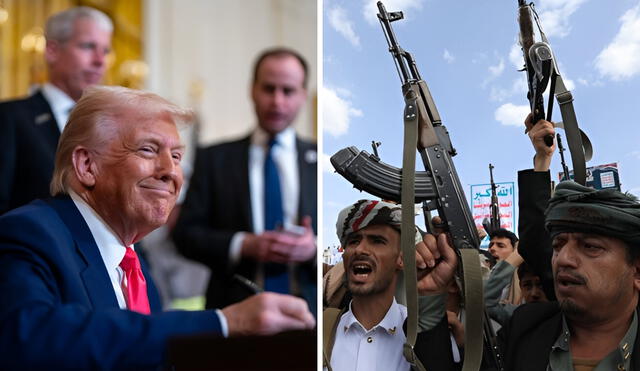Trump orders halt to U.S. Airstrikes on Houthis after ceasefire agreement
As President Trump halts U.S. airstrikes in Yemen, a fragile diplomatic dance begins—backed by Oman, shadowed by Iran, and tested by the Houthis' next move.

President Donald Trump announced that the United States will halt its bombing campaign against Yemen's Houthi rebels. This decision follows nearly two months of airstrikes targeting over 800 sites, resulting in hundreds of casualties. The announcement came after the Houthis indicated a willingness to cease hostilities, stating they no longer wish to fight. Trump emphasized that the cessation of U.S. strikes is contingent upon the Houthis stopping their attacks on American ships in the Red Sea. He described the arrangement as an informal understanding rather than a formal agreement.
The Houthi attacks had significantly disrupted international shipping routes through the Red Sea, forcing commercial vessels to reroute around Africa, leading to delays and increased costs. A senior Houthi leader previously suggested that attacks would cease if the U.S. stopped its bombing campaign. While the U.S. has agreed to halt airstrikes, the broader regional tensions remain unresolved. Israel, for instance, has intensified its military actions against the Houthis following missile attacks on its territory. On May 5, Israeli forces conducted airstrikes on Houthi-controlled areas in Yemen, including the port city of Hodeidah.
Omani mediation aims for Houthi ceasefire as U.S. Strike pause faces uncertainty
The ceasefire discussions were facilitated by Omani mediation, with Trump's special envoy, Steve Witkoff, playing a pivotal role. Oman's Foreign Minister, Badr Albusaidi, confirmed the country's involvement in brokering talks between the U.S. and the Houthis. These negotiations also intersect with ongoing U.S.-Iran discussions concerning Iran's nuclear program, given Iran's support for the Houthi movement. The success of the Houthi ceasefire could positively influence the broader diplomatic landscape in the Middle East.
Despite the announced halt in U.S. airstrikes, the situation remains complex. The Houthis have not publicly confirmed a ceasefire with the U.S. and have indicated that their military actions will continue until hostilities in Gaza cease. This stance suggests that while attacks on American ships may stop, other forms of aggression could persist. Furthermore, the Pentagon and U.S. Central Command have not officially confirmed the cessation of strikes, adding to the uncertainty.

ALSO SEE: Governor Newsom proposes $7.5B federal film tax credit in response to Trump's foreign film tariffs
U.S. operation rough rider faces scrutiny as Trump signals shift in strategy against Houthis
The U.S. military campaign, known as "Operation Rough Rider," began in response to Houthi attacks on Red Sea shipping lanes. The campaign has involved significant assets, including aircraft carriers and B-2 bombers, and has resulted in both military and civilian casualties. Critics have questioned the effectiveness of the campaign, especially given the continued Houthi missile attacks, including one that forced a U.S. Navy carrier to take evasive action.
In summary, while President Trump's announcement marks a potential de-escalation in U.S.-Houthi hostilities, the broader regional dynamics, including Israeli military actions and the Houthis' ties to Iran, continue to pose challenges. The situation remains fluid, with ongoing diplomatic efforts aiming to stabilize the region and address the underlying causes of conflict.












